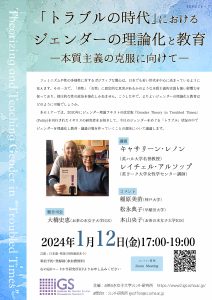2024.1.12 The IGS seminar “Theorizing and Teaching Gender in “Troubled Times””
Amidst a resurgence of gender essentialism, including anti-trans feminism, and the weaponization of gender by populist movements, Kathleen Lennon and Rachel Alsop discuss their book, Gender Theory in Troubled Times (2020), which explores the production and experience of gender. Rather than seeking to establish a “truth about gender”, the speakers explore how elements including the body, societal structure, and culture, function intersectionally to form gender as it is lived and understood. Looking forward, they argue for a coalition politics that opposes gender essentialism and binarism.
Introducing the central claims of their book, Alsop and Lennon argue that sociohistorical location is integral to the construction of gender, which is negotiated alongside other categories of social identity. The speakers began by connecting their conversation to a Japanese context, referencing the persistence of gender inequality in Japan and rising disinformation towards trans people. Alsop and Lennon proceeded by addressing the perennial question, “What about the body?”. The speakers explained how social categorization leads children to understand themselves as gendered, emphasizing that biological categories, rather than being innate, exist as a consequence of the meaning we assign them. They then examined how the formation of gendered categories is dependent on time and place, employing intersectionality as a framework to understand how positionality, including race, gender, sexuality, and ability, mutually construct how gender is experienced. Turning to the needs of the current political moment, Alsop and Lennon discussed how queer and trans communities and the coalitions alongside them can and are working towards the diversification of kinship relations that challenge the constrictiveness of gender roles. In their concluding remarks, they expressed hope in young people’s growing rejection of gender essentialism and binarism.
The presentation was followed by a thought-provoking discussion, featuring comments from three scholars of gender with different disciplinary backgrounds. Minae Inahara, supervised by Lennon during her time at the University of Hull, discussed the lineage of Lennon’s work, which challenges essentialism while acknowledging how bodily differences, such as gender, race, and disability, influence lived experience. Following Inahara’s comment, Noriko Matsunaga raised the issue of the invisibility and erasure of race and ethnicity amidst the Japanese government’s refusal to engage in dialogue on immigration, despite a declining workforce. In response to Mastunaga’s question on how to effectively use the concept of intersectionality in the classroom to address issues such as the continued invisibility of race and ethnicity, Alsop underscored the need to both teach and challenge these categories. From a global governance perspective, Hisako Motoyama concluded the Q&A session by asking how to raise awareness of gender essentialism in neoliberal politics that promotes gender equality based on an understanding of equality between two biological sexes, and how to address the issue of gender essentialist understandings of gender and violence. The discussion with an audience question asking if it is possible to achieve justice and fairness through gender categories, while also seeking to undermine them. In response, Lennon and Alsop stated that such categories can be employed strategically, and re-asserted the necessity of intersectional alliances.
Reported by Emi Yasuda (Master’s Student, University of Tokyo)


